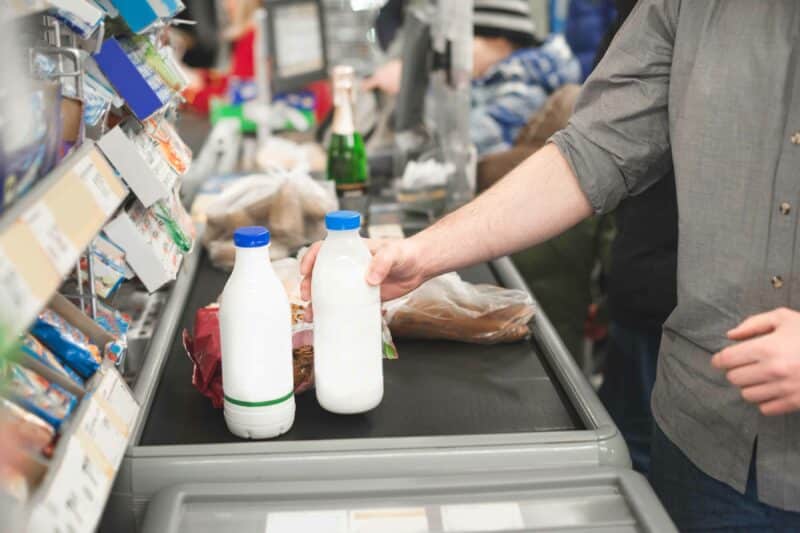According to experts, prices in stores will continue to rise in the first quarter of this year, though probably at a slower annual rate and likely in single digits. During this time, food additives, bread, meat, dairy, and household chemicals may see the biggest price increases. Conversely, fat products may become cheaper. Some economists suggest that price inflation in stores could accelerate again in subsequent quarters. Such a scenario could begin to unfold as early as March, just before Easter. Currently, retailers are struggling with rising minimum wages and are increasingly feeling the impact of high commodity and energy carrier prices. And these burdens will most likely be passed onto consumers.
Although inflation should gradually ease for consumers, for now, we should not expect price drops in stores. This is only possible in the case of certain product categories, such as oils, which previously increased at a record pace. Overall, prices will continue to rise, albeit likely in single digits.
“The level of prices will primarily be influenced by the increase in the minimum wage. Another factor will be significant energy price increases, which continuously impact the cost structure of companies,” says Dr. Anna Semmerling from WSB Merito. “External factors include variable weather conditions, which – as shown last year – can strongly influence the prices of vegetables or fruits, among other things. We also shouldn’t forget about the increase in excise tax rates, which will directly affect the increase in the price of cigarettes, tobacco, and alcohol,” adds the expert.
Despite this, experts stress that prices in retail chains should not see a significant increase in the first quarter of 2024. Many stores also continue a strategy focused on pricing promotions on the most sensitive products, such as oil or butter. The projected inflation rate for 2024 ranges from 5 to 6.5%, which shows that price increases will still be noticeable, but definitely not to the same extent as in the previous two years.
“For this reason, Poles have the opportunity to purchase selected products at prices even before the inflation period,” says Dr. Semmerling. “However, this does not mean that store prices will be stable. According to forecasts, bread, meat, and dairy will continue to become more expensive, and seasonally, the prices of vegetables and fruits will also increase. Importantly, prices in 2024 won’t shock Poles as drastically, we will rather gradually move towards stability,” adds the expert from WSB Merito.
Other experts underline that significant increases in sugar prices are also predicted, which impacts sweets and all products in which it is used. “Generally speaking, we should expect a higher price increase also in categories where production is heavily dependent on energy and fuel prices,” says Dr. Robert Orpych from WSB Merito. “The level of prices in 2024 will depend largely on further decisions regarding the zero VAT rate on basic food products. Protective programs against rising electricity, natural gas, and heat prices will also be important,” adds Dr. Orpych.
Dr. Tomasz Kopyściański from WSB Merito University explains that in the first quarter of 2024, we should note a stabilization of prices in retail stores, understood as a moderate, single-digit increase compared to the previous year. This will be a pleasant change for consumers after last year’s two-digit price jumps in many product categories.
“There is a risk of a few percent increase in the categories of goods that consume large amounts of electrical energy in their production, such as bread or cold meats,” adds Dr. Kopyściański. He also emphasizes the positive news. Rapeseed, the main raw material needed for oil production, shows a downward trend that may continue in the coming months.
However, this is only part of the picture. According to economist Piotr Kuczyński, an analyst from DI Xelion, at the turn of the second and third quarters, the increase in prices may accelerate again. The main factors that could impact these expected hikes are the declining base from the previous year (inflation was quickly falling), increasing oil prices (revival in China), and the exchange rate of the Polish zloty. “As it stands, it should be strong, but this may change if the dollar gains in value,” explains the expert.
In addition, the effect of Easter holidays, occurring at the turn of March and April, which annually drive up prices in several categories, is pointed out by Robert Biegaj, a retail market expert from the Offerista Group. As a result, the picture of the market situation may change, which may herald a change in price increase trends.
“In my opinion, food additives such as mayonnaise, ketchup, and mustard will see the biggest price increase in the first quarter of this year. I predict this will also apply to bread, meat, dairy, as well as household chemicals and vegetables and animal fats,” says Robert Biegaj.
Some experts highlight that the likely partial thawing of energy prices in the second half of 2024 will impact prices. Also noted are the difficult-to-predict levels of this year’s grain, fruit, and vegetable harvests.
